 Petzlover
Petzlover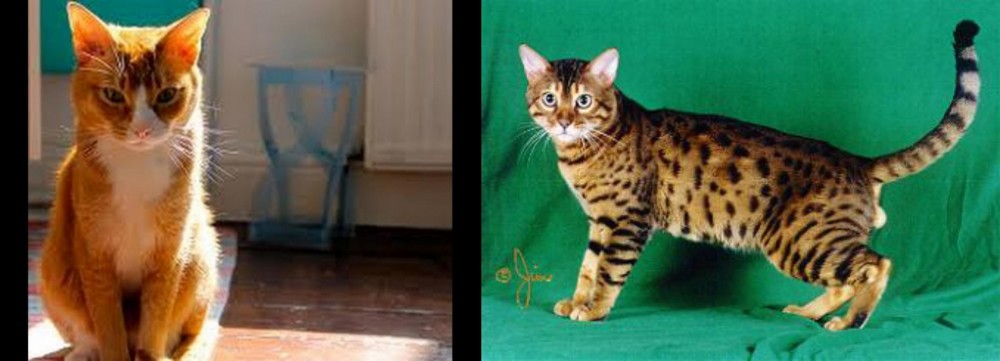 Chausie is originated from Egypt but Bristol is originated from United States. Both Chausie and Bristol are having almost same weight. Chausie may live 4 years less than Bristol. Both Chausie and Bristol has same litter size. Both Chausie and Bristol requires Low Maintenance.
Chausie is originated from Egypt but Bristol is originated from United States. Both Chausie and Bristol are having almost same weight. Chausie may live 4 years less than Bristol. Both Chausie and Bristol has same litter size. Both Chausie and Bristol requires Low Maintenance.
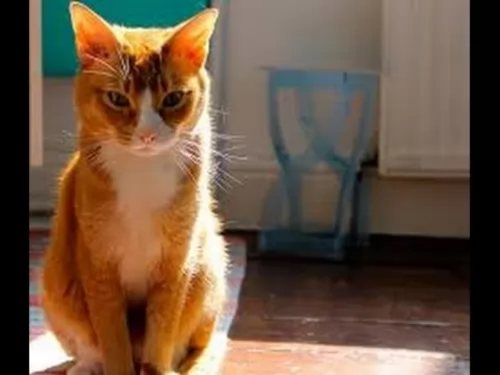 The Afro-Chausie came about from breeding a few individuals from a species of jungle cat which was native to India, Asia and the Middle East. In other words, this is a cross between a wild cat and a domesticated cat.
The Afro-Chausie came about from breeding a few individuals from a species of jungle cat which was native to India, Asia and the Middle East. In other words, this is a cross between a wild cat and a domesticated cat.
It was only in 1995 that the Chausie was recognized as a domestic breed, and by the International Cat Association.
The Chausie breed essentially began in the 1990s, when breeders name the breed Chausie and also developed a breeding program. They received registration status in 1995. Chausies are bred in North America and Europe and in 2003 became a new breed in the United States.
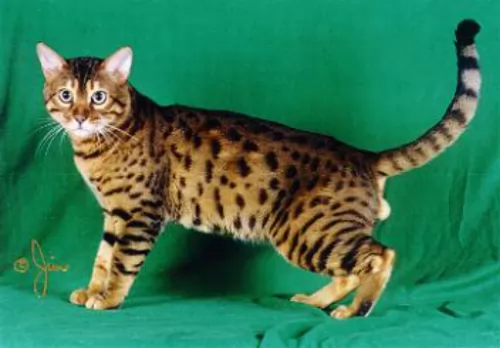 The Bristol cat hails from Texas and was developed during the 1980s, using a south American wild cat and domestic cats.
The Bristol cat hails from Texas and was developed during the 1980s, using a south American wild cat and domestic cats.
The Bristol cat isn’t well-known and in fact, its origins are shrouded in mystery.
The cat was recognized and admitted into the TICA (The International Cat Association. It is looked upon as a hybrid breed or a designer cat.
Nobody seems to know when the first Bristol cat was even bred. Because of its exotic nature, it is believed to be a cross between the American Shorthair and the margay or similar breed.
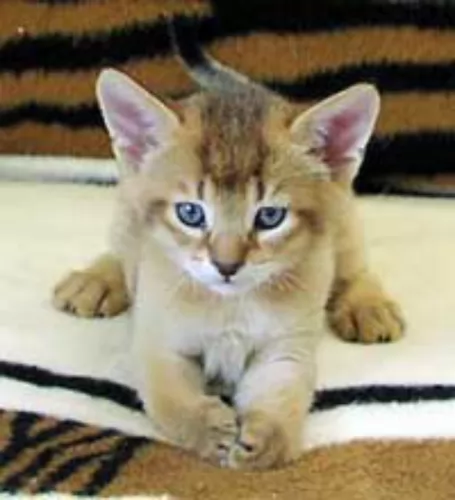 The Chausie is a medium to large cat with a long body and long legs. In fact, the hind legs are somewhat longer than their front legs, and they’re able to easily leap into the air and up onto high perches. Some people say these cats look like Pumas.
The Chausie is a medium to large cat with a long body and long legs. In fact, the hind legs are somewhat longer than their front legs, and they’re able to easily leap into the air and up onto high perches. Some people say these cats look like Pumas.
The adult Afro-Chausie can weigh between 5 to 9kg and they stand in height from 35cm to 45cm and sometimes taller, both male and female.
The ears of the cat are broad and tall and the almond-shaped eyes are a yellow to green shade. The TICA Chausie breed standard says that the cat comes in 3 colors – a black/brown ticked coats, solid black and black grizzled tabby, but in fact, they come in quite a few other colors and patterns too.
Your Afro-Chausie is an intelligent, loyal, social and athletic cat that is also playful. They love their human companions and will form a deep bond with them, making it difficult to rehome him later on.
They don’t like being alone, in fact to such an extent that they will befriend dogs in the home too. This is such an active cat and you can even train him to walk on a leash.
It’s a cat that also loves water and Similar to Bengals and Savannahs, this breed, too, enjoys water. This cat will form deep bonds with owners, hence rehoming has been known to be particularly challenging with this breed
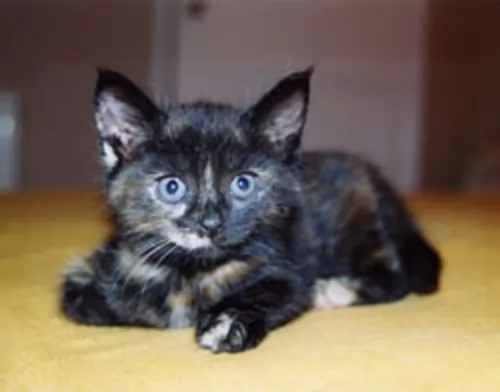 Bristol cats are medium-sized and muscular, powerful cats. They are much like Bengal cats. They have a smokey charcoal appearance while others have quite a bit of white on them.
Bristol cats are medium-sized and muscular, powerful cats. They are much like Bengal cats. They have a smokey charcoal appearance while others have quite a bit of white on them.
They also have rosettes and small rounded ears. The origins of the Bristol breed are uncertain but it seems a multi-colored cat was adopted by a United States Army captain in Australia.
The cat was so adored it was brought back when they returned to the United States. The cat was already pregnant and she gave birth to 2 kittens. The coats are shiny and short-haired with spots and lines of fawn, grey and brown mostly with the eyes being green.
The Bristol cat has a very pleasing disposition – being amicable, playful, and loving. They’re intelligent cats too but they need to spend time in solitude as well.
They definitely don’t respond and bond to everyone in the human family but tend to respond to only one person.
These Bristol cats are cunning and self-confident and because of their wild side, they will need a large area to roam. This is definitely not a cat for city life.
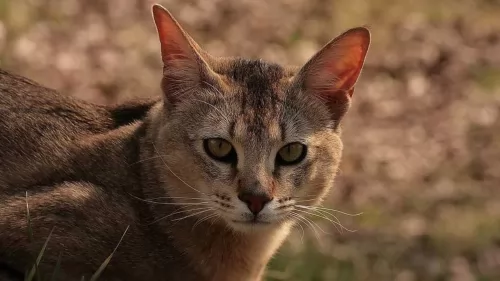 The Chausie loves human contact and they love games with their human family.
The Chausie loves human contact and they love games with their human family.
They’re intelligent and are constantly looking for things to do. They are athletic and have plenty of energy. They’re social, playful and make great playmates for children who have been taught to respect animals.
When you bring an Afro-Chausie into your home, you can expect to have a lot of action and entertainment with this beautiful cat.
 The Bristol cat is beautiful all right, but once again humans should just leave wild cats alone in the bush.
The Bristol cat is beautiful all right, but once again humans should just leave wild cats alone in the bush.
Mixing them with domestic cats doesn’t work in the long run, and many of these cats land up in shelters because of unruly behavior. The Bristol cat is part wild and it doesn’t seem to have a future although there isn’ enough information online to really know what its future is.
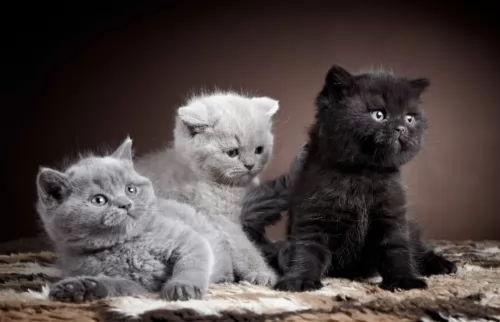 With good health, your Afro Chausie can live to be anything between 12 – 16 years of age. These cats are prone to developing food allergies, and this is why it is important to feed your Chausie high-quality food.
With good health, your Afro Chausie can live to be anything between 12 – 16 years of age. These cats are prone to developing food allergies, and this is why it is important to feed your Chausie high-quality food.
They’ve got fragile digestive systems and many are gluten intolerant.
All kinds of parasites can invade your Afro-Chausie’s body – internally and externally so be sure to have your Chausie checked over for parasites such as tick and fleas, worms and mites.
Check your Chausie for putting on too much weight as these cats have a huge appetite.
You just have to bear in mind that these cats can develop any of the illnesses that other domesticated cats get
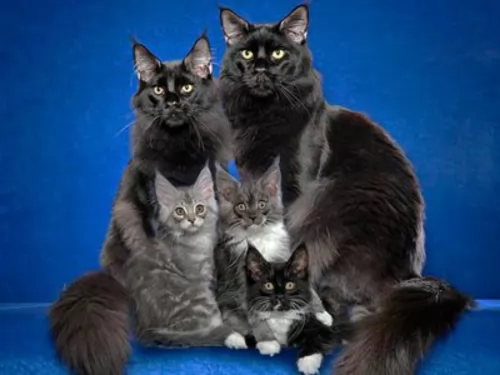 With their short coats, they only need to be brushed once a week as they are moderate shedders.
With their short coats, they only need to be brushed once a week as they are moderate shedders.
Provide your cat with a quiet place to sleep and which is comfortable and dry.
A cat tree can be useful for allowing your cat to climb and scratch.
Chausies are essentially meat-eaters. They don’t want to eat fruit and nuts. One of the Chausie’s ancestors was a wild cat and this is why they don’t eat the same foods as what your dog does.
Every cat thrives on a high-protein, low-carbohydrate diet. A dog’s diet with scraps from the table as well as human food can be fatal for your Chausie if it becomes your cat’s regular food.
He requires a diet of quality meat – beef, chicken, fish and organs – all foods that are easily digestible for your cat. Cats also need taurine from muscle meat such as shellfish and fish.
Always make sure your Chausie has access to a constant supply of fresh, cool water.
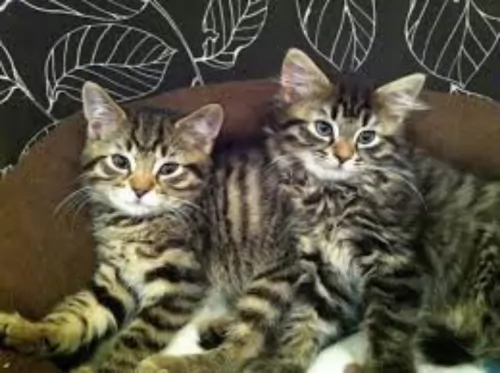 The diet of a cat such as the Bristol will include small rodents, however once domesticated, these cats will need a diet high in protein. The cat is a carnivore and to be healthy it will require high-quality premium commercial cat food that is appropriate for the age of your cat and his health status.
The diet of a cat such as the Bristol will include small rodents, however once domesticated, these cats will need a diet high in protein. The cat is a carnivore and to be healthy it will require high-quality premium commercial cat food that is appropriate for the age of your cat and his health status.
The best cat food has taurine in it, an essential protein that cats can only obtain through quality food. Your adult Bristol cat may prefer eating several smaller meals and this is actually a good idea as smaller frequent meals help towards greater urinary tract health.
If you want a healthy cat, you have to be diligent with providing such a cat with good food that is high in protein. If you aren’t sure, your veterinarian will be able to advise you on what to feed your new cat or kitten.
Factors such as age, size, activity levels, and health make a difference to what you feed your cat, how much and how frequently.
Get into a habit of reading and understanding the labels on the cat food packaging. Certainly, every cat requires taurine, an essential amino acid. You will also need to ensure fresh, cool water day and night.
Always take your pet to the veterinarian if he is lethargic ad disinterested in his food.
Most cats are clean, but you should brush or comb your Bristol cat regularly as the brushing helps keep your cat's coat shiny and also reduces the amount of hair during shedding.
Provide your Bristol cat with a dry, warm sleeping area and keep the bedding clean.
Your Bristol cat needs to wear a safety collar and an ID tag. These ID tags or an implanted microchip can help ensure that your Bristol cat is returned if he becomes lost.
Cats scratch, and cutting your cat’s nails will keep the nails blunt. Nonetheless, to prevent your furniture from being scratched, provide your cat with a strong scratching post covered with a rough material such as sisal or tree bark.
Bristol cats are independent and they don’t require any kind of special care. Certainly, they require large areas for their active lifestyle as well as a shallow pool for swimming.